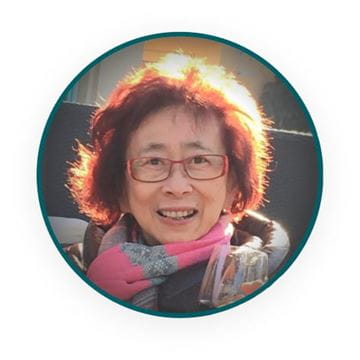An immigrant's recovery: paving the path to mental health

Caroline: I am from Hong Kong, went to undergraduate school in the United States, traveled to Europe on my own, and received a Diploma of Education from the University of Hong Kong. Coming to Toronto with my husband, I had to re-train to get a teaching job at the Toronto District School Board. As a new immigrant, I knew nothing about Canadian culture.
Caroline: I have recovered partly due to my continuation of taking the appropriate dose of effective medications with no side-effects, a supportive psychiatrist, Dr. John Klukach, and several self-help strategies. My spirituality gives me strength. Friends now accept me. My professor at a Yale University summer creative writing course believed that I could write. I began to write about what I had experienced, and professionals gives me encouragement. I also give presentations about mental health at conferences/hospitals in both North America and Asia. My dreams are realized, and confidence regained.
Caroline: My advice would be to assure newcomers that they are now safe in Canada. Once they feel safe, I would provide them with resources such as connections with family physicians, information about the mental health system, social and cultural support, psychosocial education, and connections to their community of origin. To provide them with ESL training, links to affordable housing, employment opportunities give them safety and hope, and to explore their strengths, are important elements to mental health. When mental health symptoms are detected, clients feel demoralized or anxious. I would encourage them to overcome their fear of the mental health system and to seek help immediately.
Producer: what advice would you give to healthcare providers working with a new immigrant or a refugee in a similar situation like you were in and dealing with mental illness?
Caroline: Healthcare providers must seek a cultural understanding of immigrant and refugee populations, be aware of cultural manifestations of emotional problems, and learn to be empathic of the trauma and stress experienced in the migration journey. To put their clients at ease in opening their feelings up, healthcare providers should use a non-threatening approach, build a trusting therapeutic relationship with their patients, and greet them with a welcoming smile.
Caroline: Free to Fly: A Story of Manic Depression is my biographical narrative as an Asian immigrant diagnosed with bipolar disorder. I suffered initial fear with the clinical psychiatric treatment and the mental health system, and stigma of the illness by the community.
Journeys of Renewed Hope consists of seven stories on the theme of empowerment and recovery from mental illness. The fictional characters, mainly immigrants and refugees, suffer from mood disorders, anxiety, post-partum depression, and post traumatic stress disorders. The clinical model plays a role in their recovery, but more so, elements in the empowerment model of the recovery movement (safety, cultural support, familial acceptance, resilience in overcoming stigma, spirituality, hope, and dreams) also contribute an important role.
I hope that through these stories, awareness of mental disorders can increase. The public and the professionals need to know more about a) the ubiquity of mood disorders and b) the fact that recovery from mental illness is the rule, not the exception.
The reasons I wrote these two books are to let the public, especially new immigrants and refugees, know that mental illness is very common. One in five Canadians suffers from mental illness, mainly mood disorders and anxiety, regardless of age, gender, cultural and intellectual backgrounds. One should get help when early symptoms are detected. Research demonstrates that mental illness is treatable, and recovery is highly probable.
Ms. Kwok is available for workshops/lectures on immigrant and refugee mental health and also about the significance of the recovery movement. She has given presentations at national and international conferences.